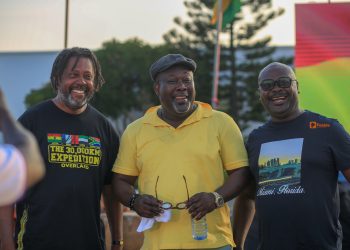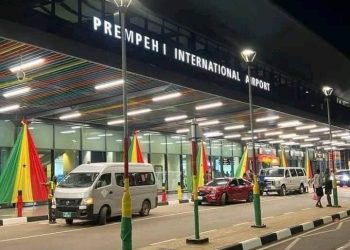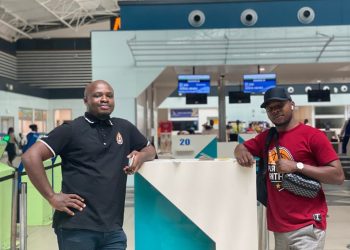Festivals in Ghana occur throughout the whole year and are used as a means to remember their ancestors. They are a year-round affair with different regions, ethnic groups and tribes having different celebrations. These rituals and celebrations are an important part of daily life and this can be easily seen by the large gatherings that are seen at festivals.
Bugum Festival
This festival is held by many ethnic groups in Northern Ghana. Most Muslims and Non-Muslims take part in the celebration. The fire (Bugum) festival is observed by the Muslims to mark the landing of Prophet Noah’s (Nuhu) Ark after the flood. It is celebrated in the night with bundles of grass used as torches.. The Islamists hold the view that following the great flood during the time of Prophet Noah (Nuhu), the Ark landed in the night and torches were lit to enable Prophet Noah (Nuhu) and his people to see whether they were on land. Besides, the Traditionalist are of the view that, one great king lost his son and when night falls a search party had to light torches (flash lights) in order to search for the prince in the night.
It is celebrated by the Mamprusi and all other tribes and groups that have their ancestral linage to the Mamprugu kingdom including the Dagombas, Gonjas, Nanumbas, Frafras, Kusasi and Kumkombas.
ABOAKYIR (Deer hunting)
A hunting expedition by two Asafo groups to catch live antelope in a nearby game reserve. The first group to present its catch to the Chief at a colourful durbar is declared the winner and is highly regarded for bravery. The name ‘’Aboakyer’’ translates as ‘hunting for game or animal’ in Fante dialect as spoken by the people of the Central region. The institution of the festival was to commemorate the migration of Simpafo (traditional name given to the people of Winneba). On the first day of the festival, the two Asafo Companies (warrior groups) in Winneba take part in a hunting expedition. The first troop to catch a live bushbuck from a game reserve used for this purpose and present it to the chiefs and people at a colorful durbar is declared winner and is highly regarded for bravery. The bushbuck is sacrificed and this signifies the start of the Aboakyer festival.
Ohum Festival
is celebrated twice a year in June/July and September/October by the chiefs and people of the Akyem Traditional Area. It marks the anniversary of the Akyem Nation, worshipping the ancestral stools and the spirits of those who occupied them. The celebration is also to mark the first yam harvest of the year and to ask for blessings for the coming year. The Ohum festival is celebrated in Akyem Abuakwa in two parts; the Ohumkan and the Ohumkyire.
BAKATUE (Fish Harvesting)
A royal procession of chiefs and stool holders riding in palanquins through principal streets to a sacred shrine where chiefs pour libation and sprinkle sacred food. Pouring of mashed yam and eggs into the Lake (lagoon), followed by scooping with a net, after which permission is given to fishermen to open the fishing season, after a ban. A solemn ‘net casting’ ceremony symbolizes the beginning of a new fishing season. The Festival culminates in a regatta of colourful canoes on the Benya Lagoon and processions. Takes place on the first Tuesday of July in Edina/Elmina, 99 miles west of Accra.
Kundum Festival (Yam Festival)
Kundum Festival (Yam Festival) is celebrated in the Western Regions by the chiefs and people of Sekondi coastal tribes, the Ahantas and Nzemas between July and November. It is celebrated to remember their ancestors and ask for their help and protection. It is also used to purify the whole state and celebrates the goddess of fertility for providing a bumper harvest.
Asafotu-Fiam Festival

Asafotu-Fiam Festival is an annual warriors festival celebrated by the people of Ada in the Greater Accra region. It takes place from the last week of July to the first weekend of August and commemorates the victories of the warriors in battle and those who fell on the battlefield. Re-enactments of the historic events take place with warriors dressed in traditional battle dress. It culminates in a colourful procession of the Chiefs accompanied by traditional military grounds with drumming, singing and dancing through the streets and onto the durbar grounds.
HOMOWO (Harvest/Thanksgiving)

Ceremonies for this festival include a procession of chiefs through principal streets with all twins in the area dressed purposely for the occasion, with traditional drumming and dancing. At the climax of the festival, from 12 noon to 6pm any woman, no matter their status is expected to accept a hug from a man on the festival street. A special dish is also prepared from ground corn, steamed and mixed with palm oil and eaten with palm nut soup. A month-long festival celebrated in Accra/Ga Traditional Area.
ODWIRA (Harvest/Thanksgiving)

This festival dramatizes the traditional myths and legends of the people and commemorates a period of remembrance and thanksgiving to the gods for their mercies in the past year, and the renewal of family and societies. A week-long celebration climaxes on Friday with a durbar of chiefs crowns the celebration with a procession through the town to the palace amidst drumming and dancing. Celebrated in most Akwapim towns during September and October with the most colourful festivities taking place in Akropong Traditional Area, 90 miles north of Accra, but also taking place in Kumasi, Amanokrom and Aburi in the Eastern Region.
HOGBETSOTSO
Symbolizes the migration of Anlos from the tyrannical ruler of Notsie in older day Togoland to their present homeland in Ghana. Chiefs dress in colourful traditional dress and sit in state to receive homage from their subjects, dancing, singing and merry-making go on throughout the festival. The main durbar takes place on the first Saturday in November. Anlo Traditional Area, 88 miles east of Accra.
ADAE AND AKWASIDAE (festival of Purifying of the Ashantis’ ancestral stools)
During the festivals, the Kings of Asante worship their ancestral stools and skeletons of the past Kings preserved at the Bantama mausoleum. Kumasi, 168 miles north of Accra.
Still have some travel questions? Ask in our Travel WhatsApp Group.







